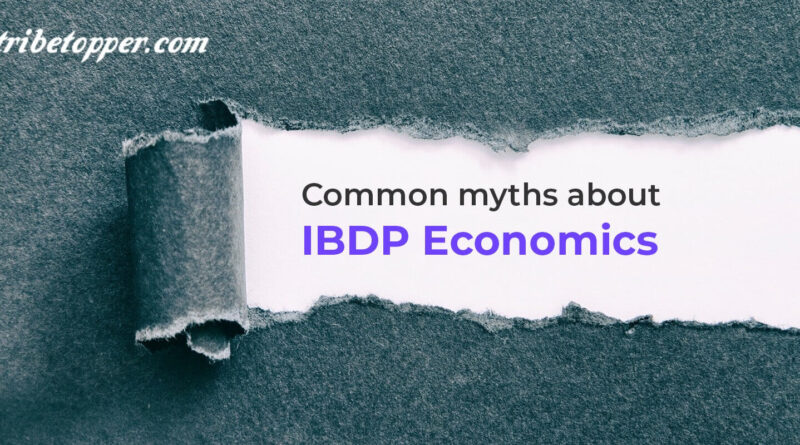Busting Most Common Myths About IBDP Economics
IBDP Economics can be challenging for some students due to its complex concepts and analytical nature. Here are a few reasons why it is considered challenging:
- Abstract concepts: Economics deals with abstract concepts such as supply and demand, elasticity, market structures, and macroeconomic indicators. Understanding and applying these concepts can be difficult for some students.
- Analytical skills: Economics requires students to develop strong analytical skills to analyze and interpret data, graphs, and economic theories. This includes understanding how different factors influence economic outcomes and being able to evaluate economic policies critically.
- Quantitative aspects: Economics involves quantitative analysis, which requires students to work with mathematical equations, graphs, and data interpretation. Some students may find it challenging to apply mathematical concepts to economic problems.
- Breadth of content: The IBDP Economics syllabus covers a wide range of topics, including microeconomics, macroeconomics, international economics, development economics, and evaluation of economic policies. Managing and understanding such a broad range of content can be demanding.
- Real-world application: Economics requires students to apply economic theories and concepts to real-world scenarios. This can involve analyzing current economic events, evaluating economic policies, and understanding the implications of economic decisions. Connecting theory with real-world examples can be challenging for some students.
Common Myths Students Have While Preparing for IBDP ECONOMICS
The International Baccalaureate Diploma Programme (IBDP) is a rigorous and comprehensive educational program that aims to develop students’ intellectual, personal, emotional, and social skills. One of the subjects offered in the IBDP is Economics, which focuses on understanding the principles and theories of economics and their real-world applications. However, several common myths and misconceptions surround the IBDP Economics course. In this essay, we will address some of these myths and provide a clear understanding of the subject.
Myth 1: Economics is all about money and finance
One of the most prevalent misconceptions about Economics, not only within the IBDP but also in general, is that it solely revolves around money, finance, and stock markets. While these topics form a part of the subject, Economics is much broader. It encompasses studying how societies allocate scarce resources to fulfil unlimited wants and needs. It involves analyzing human behaviour, decision-making processes, market dynamics, government policies, and the impact of various factors on the overall economy. Money and finance are just a subset of the larger field of Economics.
Myth 2: Economics is a purely theoretical subject
Another common misconception is that Economics is purely theoretical and lacks practical applications. In reality, Economics is both theoretical and empirical. While it does involve understanding and applying economic theories, it also emphasizes analyzing real-world data and examining actual economic events and policies. The IBDP Economics course encourages students to critically evaluate and apply economic theories and models to real-world situations. This combination of theory and application helps students develop a holistic understanding of Economics.
Myth 3: Economics is only for students interested in pursuing a career in Economics
Some students believe that studying Economics in the IBDP is only beneficial if they intend to pursue a career in Economics. However, Economics is a versatile subject that provides students with various skills and knowledge applicable to various fields. The analytical and problem-solving skills developed through the study of Economics can be valuable in fields such as business, finance, public policy, international relations, law, and even entrepreneurship. Furthermore, Economics fosters critical thinking, data analysis, and decision-making skills that benefit many aspects of life.
Myth 4: Economics is a difficult subject with complex mathematical concepts
While Economics involves mathematical tools and concepts, it is not necessarily a subject only for mathematically inclined students. The IBDP Economics course focuses on developing students’ understanding of fundamental economic principles rather than complex mathematical derivations. It emphasizes applying economic concepts to real-world scenarios, encouraging students to analyze and evaluate economic issues using logic and critical thinking. The mathematical aspects of Economics in the IBDP are primarily limited to basic algebraic calculations, graphical analysis, and interpreting data.
Myth 5: Economics is only about supply and demand
Supply and demand are indeed fundamental concepts in Economics, but they are not the sole focus of the subject. Economics encompasses many topics, including macroeconomics, microeconomics, international trade, development economics, market structures, monetary policy, fiscal policy, and more. The IBDP Economics course introduces students to these various aspects, providing a comprehensive understanding of the discipline beyond the simple interaction of supply and demand. Students learn to analyze economic issues from multiple perspectives and explore the interconnections between economic variables.
Conclusion
Myths and misconceptions surrounding the IBDP Economics Mock Tests are often rooted in an oversimplification or misunderstanding of the subject. Economics is a multifaceted field that extends beyond money and finance, combines theory and application, has broad career applications, is accessible to students with varying mathematical abilities, and encompasses more than just supply and demand.
Students can overcome these challenges and excel in IBDP Economics with proper guidance, practice, and dedication. Engaging in active learning, seeking clarification from teachers, and practicing past papers can significantly improve understanding and performance in the subject.
